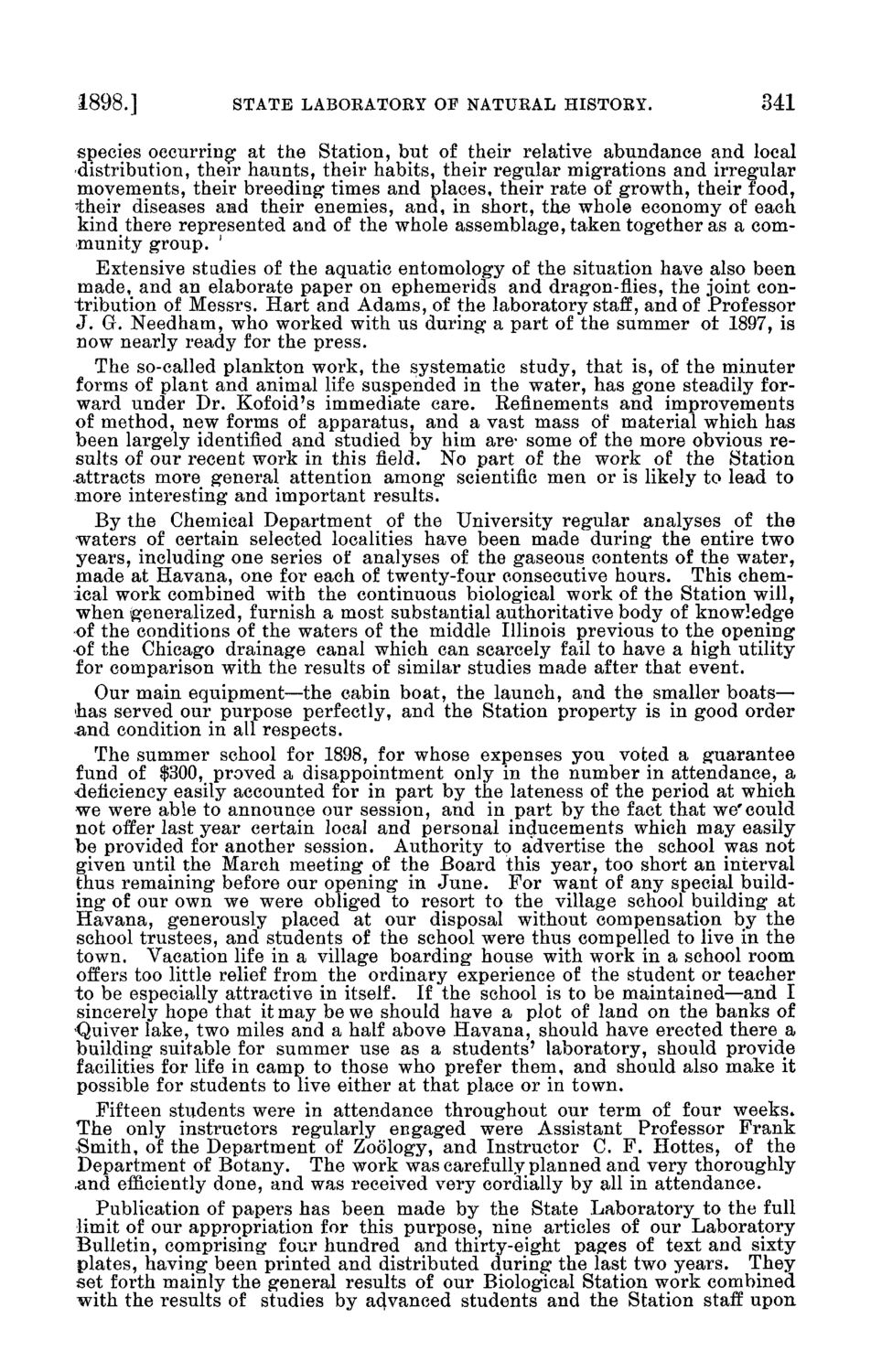| |
| |
Caption: Board of Trustees Minutes - 1898
This is a reduced-resolution page image for fast online browsing.

EXTRACTED TEXT FROM PAGE:
1898.] STATE LABORATORY OF NATURAL HISTORY. 341 species occurring at the Station, but of their relative abundance and local distribution, their haunts, their habits, their regular migrations and irregular movements, their breeding times and places, their rate of growth, their food, their diseases and their enemies, and, in short, the whole economy of each kind there represented and of the whole assemblage, taken together as a community group. ' Extensive studies of the aquatic entomology of the situation have also been made, and an elaborate paper on ephemerids and dragon-flies, the joint contribution of Messrs. Hart and Adams, of the laboratory staff, and of Professor J. Gr. Needham, who worked with us during a part of the summer ot 1897, is now nearly ready for the press. The so-called plankton work, the systematic study, that is, of the minuter forms of plant and animal life suspended in the water, has gone steadily forward under Dr. Kofoid's immediate care. Refinements and improvements of method, new forms of apparatus, and a vast mass of material which has been largely identified and studied by him are* some of the more obvious results of our recent work in this field. No part of the work of the Station attracts more general attention among scientific men or is likely to lead to more interesting and important results. By the Chemical Department of the University regular analyses of the waters of certain selected localities have been made during the entire two years, including one series of analyses of the gaseous contents of the water, made at Havana, one for each of twenty-four consecutive hours. This chemical work combined with the continuous biological work of the Station will, when generalized, furnish a most substantial authoritative body of knowledge of the conditions of the waters of the middle Illinois previous to the opening of the Chicago drainage canal which can scarcely fail to have a high utility for comparison with the results of similar studies made after that event. Our main equipment—the cabin boat, the launch, and the smaller boats— has served our purpose perfectly, and the Station property is in good order and condition in all respects. The summer school for 1898, for whose expenses you voted a guarantee fund of $300, proved a disappointment only in the number in attendance, a deficiency easily accounted for in part by the lateness of the period at which we were able to announce our session, and in part by the fact that we'could not offer last year certain local and personal inducements which may easily be provided for another session. Authority to advertise the school was not given until the March meeting of the Board this year, too short an interval thus remaining beforeT our opening in June. For want of any special building of our own we w ere obliged to resort to the village school building at Havana, generously placed at our disposal without compensation by the school trustees, and students of the school were thus compelled to live in the town. Vacation life in a village boarding house with work in a school room offers too little relief from the ordinary experience of the student or teacher to be especially attractive in itself. If the school is to be maintained—and I sincerely hope that it may be we should have a plot of land on the banks of -Quiver lake, two miles and a half above Havana, should have erected there a building suitable for summer use as a students' laboratory, should provide facilities for life in camp to those who prefer them, and should also make it possible for students to live either at that place or in town. Fifteen students were in attendance throughout our term of four weeks* The only instructors regularly engaged were Assistant Professor Frank Smith, of the Department of Zoology, and Instructor C. F. Hottes, of the Department of Botany. The work was carefully planned and very thoroughly and efficiently done, and was received very cordially by all in attendance. Publication of papers has been made by the State Laboratory to the full limit of our appropriation for this purpose, nine articles of our Laboratory Bulletin, comprising four hundred and thirty-eight pages of text and sixty plates, having been printed and distributed during- the last two years. They set forth mainly the general results of our Biological Station work combined with the results of studies by advanced students and the Station staff upon
| |